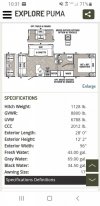Holy crap.. I just want to chime in with my little adventure over the weekend.
This is my first time towing with my new truck and all I can say is I didn't know how spoiled I was by my 2007 F350 dually crew cab, 8' bed and wished I didn't trade it in. I should of kept it as a tow vehicle.
We own a Jayco Octane 222 (26' Toy Hauler Travel Trailer) of which we purchased more so for the ramp because our one daughter is wheelchair bound and because where we like to camp requires the camper be less than 35'. My last trip to the scales on 8/14/2020, the TT weighed 7,267lbs and tongue weight of 889lbs. This trip it was loaded the exact same or extremely close, full propane, SxS and power wheelchair in it, full fridge, full gas tank and our supplies. No water, empty grey and black tanks.
With the F350, you honestly only knew you were towing when you looked in the mirrors or when you would feel a light push from heavy crosswinds. I mean seriously, you knew you were hauling because the ride was nice and cadillac 'ish. Simply put, it was a super easy sunday type driving, the 6.0 never broke a sweat and the trans ran cool and white knuckle driving didn't exist.
The Ram is a completely different experience, you knew the entire time that you where hauling a trailer. Every bump the trailer felt, you felt, every gust of wind no matter how small you felt. While I am very confident in the Rebel and its' ability to tow, I was not nearly as comfortable and did not enjoy the drive nearly as much.
Don't get me wrong, I was getting my Rebel not matter what, I just wished I would of kept the F350 for towing. I hated driving the F350 empty, concrete freeways give you what I call the "milkshake effect", great when your wife is in the truck

. Jigglies gonna jiggle.. I hated parking the F350, turning radius is abysmal, not terrible for getting into a spot but hard to get out. I hated not being able to wash it at a car wash and hated narrow roads. A daily driver a dually is not and a daily driver the Rebel excels at.
Enough rant. Thought I would share.. I truly feel now for all of those wanting to tow north of 9,000lbs with their 1500, you are a brave soul..












